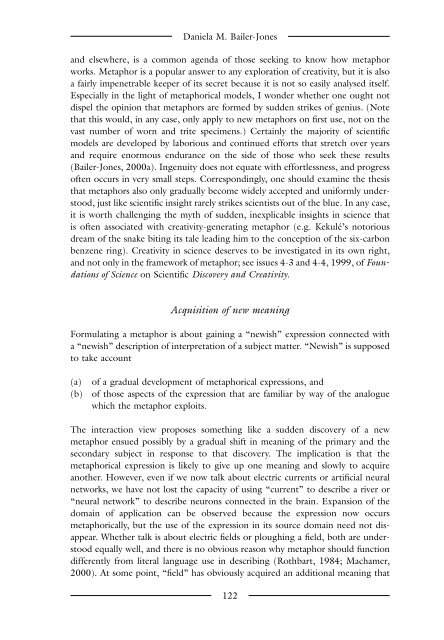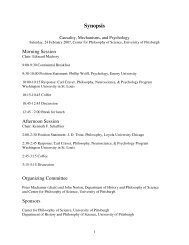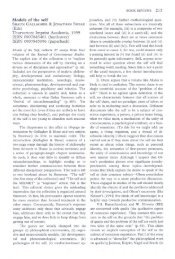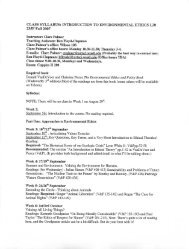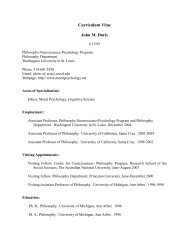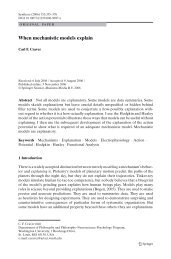The Blackwell Guide to the Philosophy of Science - The Department ...
The Blackwell Guide to the Philosophy of Science - The Department ...
The Blackwell Guide to the Philosophy of Science - The Department ...
You also want an ePaper? Increase the reach of your titles
YUMPU automatically turns print PDFs into web optimized ePapers that Google loves.
Daniela M. Bailer-Jones<br />
and elsewhere, is a common agenda <strong>of</strong> those seeking <strong>to</strong> know how metaphor<br />
works. Metaphor is a popular answer <strong>to</strong> any exploration <strong>of</strong> creativity, but it is also<br />
a fairly impenetrable keeper <strong>of</strong> its secret because it is not so easily analysed itself.<br />
Especially in <strong>the</strong> light <strong>of</strong> metaphorical models, I wonder whe<strong>the</strong>r one ought not<br />
dispel <strong>the</strong> opinion that metaphors are formed by sudden strikes <strong>of</strong> genius. (Note<br />
that this would, in any case, only apply <strong>to</strong> new metaphors on first use, not on <strong>the</strong><br />
vast number <strong>of</strong> worn and trite specimens.) Certainly <strong>the</strong> majority <strong>of</strong> scientific<br />
models are developed by laborious and continued efforts that stretch over years<br />
and require enormous endurance on <strong>the</strong> side <strong>of</strong> those who seek <strong>the</strong>se results<br />
(Bailer-Jones, 2000a). Ingenuity does not equate with effortlessness, and progress<br />
<strong>of</strong>ten occurs in very small steps. Correspondingly, one should examine <strong>the</strong> <strong>the</strong>sis<br />
that metaphors also only gradually become widely accepted and uniformly unders<strong>to</strong>od,<br />
just like scientific insight rarely strikes scientists out <strong>of</strong> <strong>the</strong> blue. In any case,<br />
it is worth challenging <strong>the</strong> myth <strong>of</strong> sudden, inexplicable insights in science that<br />
is <strong>of</strong>ten associated with creativity-generating metaphor (e.g. Kekulé’s no<strong>to</strong>rious<br />
dream <strong>of</strong> <strong>the</strong> snake biting its tale leading him <strong>to</strong> <strong>the</strong> conception <strong>of</strong> <strong>the</strong> six-carbon<br />
benzene ring). Creativity in science deserves <strong>to</strong> be investigated in its own right,<br />
and not only in <strong>the</strong> framework <strong>of</strong> metaphor; see issues 4-3 and 4-4, 1999, <strong>of</strong> Foundations<br />
<strong>of</strong> <strong>Science</strong> on Scientific Discovery and Creativity.<br />
Acquisition <strong>of</strong> new meaning<br />
Formulating a metaphor is about gaining a “newish” expression connected with<br />
a “newish” description <strong>of</strong> interpretation <strong>of</strong> a subject matter. “Newish” is supposed<br />
<strong>to</strong> take account<br />
(a) <strong>of</strong> a gradual development <strong>of</strong> metaphorical expressions, and<br />
(b) <strong>of</strong> those aspects <strong>of</strong> <strong>the</strong> expression that are familiar by way <strong>of</strong> <strong>the</strong> analogue<br />
which <strong>the</strong> metaphor exploits.<br />
<strong>The</strong> interaction view proposes something like a sudden discovery <strong>of</strong> a new<br />
metaphor ensued possibly by a gradual shift in meaning <strong>of</strong> <strong>the</strong> primary and <strong>the</strong><br />
secondary subject in response <strong>to</strong> that discovery. <strong>The</strong> implication is that <strong>the</strong><br />
metaphorical expression is likely <strong>to</strong> give up one meaning and slowly <strong>to</strong> acquire<br />
ano<strong>the</strong>r. However, even if we now talk about electric currents or artificial neural<br />
networks, we have not lost <strong>the</strong> capacity <strong>of</strong> using “current” <strong>to</strong> describe a river or<br />
“neural network” <strong>to</strong> describe neurons connected in <strong>the</strong> brain. Expansion <strong>of</strong> <strong>the</strong><br />
domain <strong>of</strong> application can be observed because <strong>the</strong> expression now occurs<br />
metaphorically, but <strong>the</strong> use <strong>of</strong> <strong>the</strong> expression in its source domain need not disappear.<br />
Whe<strong>the</strong>r talk is about electric fields or ploughing a field, both are unders<strong>to</strong>od<br />
equally well, and <strong>the</strong>re is no obvious reason why metaphor should function<br />
differently from literal language use in describing (Rothbart, 1984; Machamer,<br />
2000). At some point, “field” has obviously acquired an additional meaning that<br />
122


